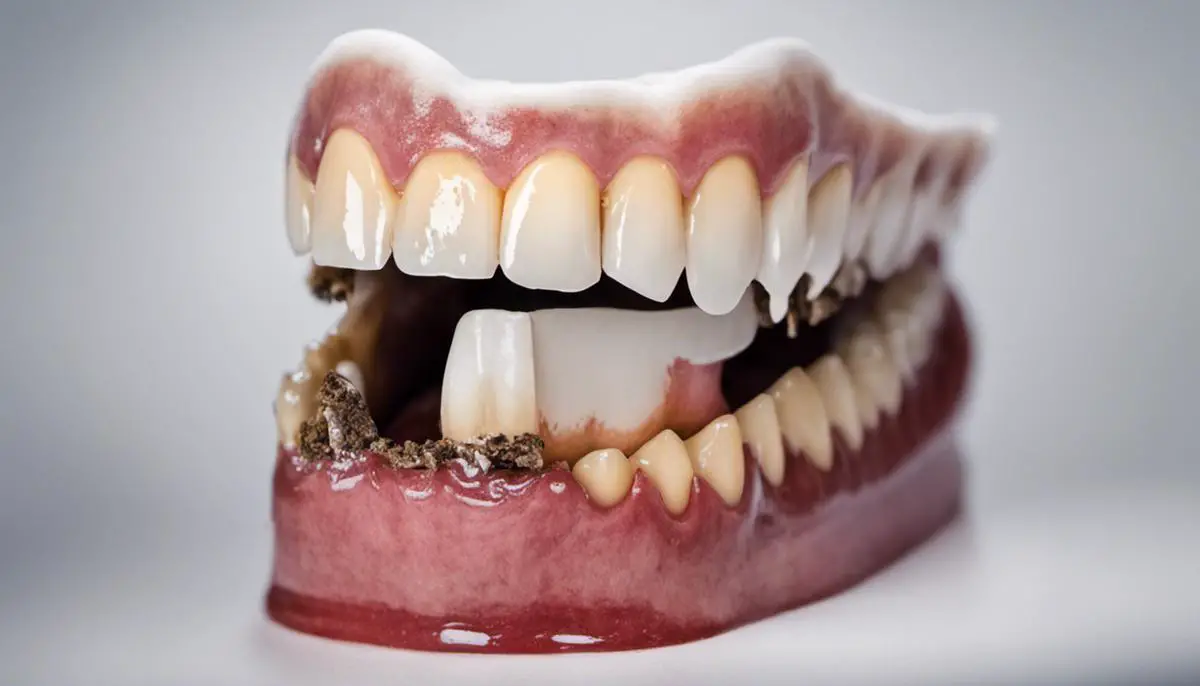Weaving within the intricate fabric of our subconscious minds, dreams and nightmares often serve as mysterious echoes of our deepest fears, hopes, insecurities, and desires. One common, yet disturbing tableau depicted in this nocturnal theater involves nightmares about teeth decaying. Our teeth, screening more than the fundamental roles of chewing and articulating speech, are profound symbols in our dreams, carrying a vast array of psychological interpretations. However, understanding these symbolic expressions can be puzzling, especially when they provoke discomfort or anxiety, as in the case of dreams about tooth decay. Therefore, delving into the realm of dreams and nightmares is instrumental in decoding their significant underpinnings, particularly those relating to teeth, and consequently managing and mitigating the distress they might cause.
Understanding Dreams and Nightmares
Understanding Dreams and Nightmares: A Psychological Overview
Dreams and nightmares are considered to be expressions of our subconscious mind. While the exact purpose of dreams is still a topic of debate among psychologists, many theories suggest that they’re an avenue for our brain to process emotions, confront fears, or resolve problems. Nightmares, on the other hand, are often disturbing dreams that stir up feelings of fear, anxiety, or distress.
Sigmund Freud, the father of psychoanalysis, suggested that dreams, including nightmares, are a form of wish fulfillment, that they symbolically represent suppressed desires. Carl Jung, another pioneer in psychology, saw dreams as a means for the individualized self to communicate with the universal self, often through the use of symbolic imagery.
Symbolism of Teeth in Dreams
One of the most widespread symbols in dreams is teeth. They are often viewed as symbols of power and confidence. Losing teeth in dreams, therefore, may symbolize a loss of confidence or power, feelings of vulnerability, or fear of rejection.
When it comes to nightmares specifically about teeth decaying, they can be interpreted in several ways. Some therapists suggest that these dreams reflect concerns about personal appearance and how others perceive you. This might be a fear of aging or becoming less attractive.
Psychoanalytic Interpretation of Decaying Teeth Nightmares
From the viewpoint of psychoanalysis, rotting teeth in dreams may represent anxiety about losing control, worry about a particular situation in life, or fear of failure. It can symbolize decay in other areas of life – perhaps a changing relationship, loss of a job, or a failure to achieve a desired goal. It might also be a sign that there’s something in your life that you need to “clean up” or address more attentively.
Managing Nightmares Involving Tooth Decay
Having regular nightmares about teeth decaying can be distressing. It’s, however, crucial to dissect the feelings these dreams induce and link it to a situation in your immediate reality. Recognizing the root of your stresses is the first step towards mitigating them.
Adopting habits that promote stress management and self-care might help. Following a steady sleep routine, exercising routinely, eating a nutritious diet, and dedicating a few minutes each day to relaxation can provide a soothing impact on your mind and might lessen the occurrence of these nightmares.
If your nightmares persist or significantly affect your daily activities, psychotherapy or counseling could be a helpful course of action. A professional therapist can help decipher your dreams, pinpoint stress or anxiety triggers, and propose coping mechanisms for handling these feelings.
Conclusively, even though nightmares about teeth decaying can be unnerving, they can also open doors for introspection, self-improvement, and emotional recovery. Comprehending the symbolism in these dreams and their potential implications is a crucial first move in controlling and eventually extinguishing these unnerving nocturnal occurrences.

Photo by jannerboy62 on Unsplash
Deciphering Tooth Decay Nightmares
Deciphering Nightmares Focusing on Tooth Decay
Nightmares involving teeth decaying or falling out are not unusual, and interpretations related to these dreams fluctuate among various beliefs and psychological ideologies. Broadly speaking, these nightmares may represent our subconscious concerns, fears, or anxieties. Nevertheless, the specific details of the dream and the unique personal scenarios of the dreamer also play a part in how these dreams are interpreted.
Freudian Interpretation of Tooth Decay Dreams
In Freudian psychology, dreams are seen as coded messages from our unconscious mind, providing insight into repressed feelings or suppressed desires. Dreaming about teeth decaying or falling out may reflect fears of becoming less attractive or fear of aging. Freud also theorized that dreams of teeth can symbolize sexual repression or might even relate to a castration complex, despite these theories being widely disputed in contemporary psychology.
Jungian Perspective on Tooth Decay Nightmares
Another heavyweight in the world of dream interpretation, Carl Jung, suggested that teeth decay dreams could symbolize a desire for self-improvement or a fear of losing power. He believed that teeth could represent the dreamer’s ability to process life experiences, with decaying teeth representing a failure or inability to do so. Jungian analysis places great importance on individual interpretation, meaning the unique feelings and thoughts of the dreamer are essential in understanding the dream’s meaning.
Cultural Interpretations of Teeth Decay Dreams
Different cultures have their own interpretations of dreams about teeth decay. In some traditions, a dream of losing or decaying teeth is seen as a bad omen, predicting death or severe illness. In contrast, other cultures see these dreams as a symbol of personal or financial loss. For instance, a loose tooth might suggest insecurity or instability in one’s life or work, reflecting a general fear of loss or failure.
Managing Nightmares About Dental Decay
Experiencing nightmares about dental decay can be intimidating and cause significant discomfort. However, several techniques can help manage and even reduce these unnerving dreams. Exposure therapy, a method that involves intentional and repeated thinking about the dream in a safe and balanced manner, can decrease fear reactions over time. Cognitive-behavioral therapy (CBT) can also be advantageous, as it assists in reshaping the negative thought processes that may provoke such disturbing dreams.
As part of the management process, implementing various relaxation exercises such as deep breathing and progressive muscle relaxation can ease the mind and the body before sleep, consequently minimizing nightmares. Recording the dream in a journal can also be beneficial. Such documentation can improve recall and understanding of the dream and facilitate emotional reconciliation, which can lower the severity of recurring nightmares.
Healthy sleep habits significantly decrease the frequency of nightmares. These may include maintaining a steady sleep schedule, developing a tranquil bedtime routine, improving the comfort and ambiance of the sleep environment, and avoiding stimulants such as caffeine and heavy meals near bedtime.
Grasping the implications of nightmares about teeth decaying is an individualized process. Through exploration of personal fears and worries, one may uncover meaningful insights that help resolve underlying issues. Despite their disturbing nature, nightmares can offer a unique insight into our subconscious mind, thus paving a way for self-realization and personal progression.

Dealing with Tooth Decay Nightmares
Interpreting Nightmares of Tooth Decay
Understanding such dreams is crucial for their management. Dreams revolving around losing teeth or decay are relatively common globally. Interpretations of these nightmares often associate them with feelings of powerlessness, fear of aging, health-related worries, or apprehensions of personal loss. Moreover, research indicates a potential correlation between such nightmares and anxiety or stress about one’s appearance or overall health.
Improve Sleep Hygiene
Improving sleep hygiene can greatly reduce the incidence of nightmares, including teeth decay nightmares. Stick to a regular sleep schedule where you wake up and go to bed at the same time each day. Create a restful environment that is quiet, dark, and cool, with a comfortable bed. Also, establish a relaxing pre-sleep routine, like reading or taking a hot bath, and avoid big meals, caffeine, and electronic devices before bedtime.
Meditation and Relaxation Techniques
Practicing mindful meditation and relaxation techniques before bed can help reduce the frequency of nightmares. Techniques such as deep breathing exercises, progressive muscle relaxation, and guided imagery can help calm the mind and body, making it easier to fall asleep and less likely to have nightmares.
Counseling and Therapy
If tooth decay nightmares persist and impact your quality of life, seeking professional help can be a good option. Psychologists and psychiatrists are trained to different types of therapy that can help you cope with your nightmares. Cognitive Behavioral Therapy (CBT) is effective in reducing nightmares and improving sleep quality. Other modalities like Eye Movement Desensitization and Reprocessing (EMDR) and Imagery Rehearsal Therapy (IRT) are also considered beneficial.
Incorporate Self-improvement Practices
Developing self-improvement practices, such as maintaining a balanced diet and regular exercise regimen, could help manage stress levels that may contribute to nightmares. Regular exercise can help regulate your sleep cycle, making it easier to fall asleep and stay asleep. A balanced diet rich in nutrients can support overall health and well-being and reduce anxiety levels, which might decrease the frequency of teeth decay nightmares.
Stress Management
Stress and anxiety play a significant role in triggering nightmares, including those entailing tooth decay. Therefore, employing stress management techniques, such as regular physical activity, relaxation techniques, and maintaining a positive attitude, can effectively lower your stress levels. Reducing day to day stress can subsequently decrease the frequency and intensity of nightmares.
Seeking Professional Assistance
Recurring nightmares that persistently disrupt your sleep and thereby impact your daily life can be quite taxing. It becomes crucial to get professional help under such circumstances. A certified psychologist or a psychiatrist can help you unearth the root causes of these nightmares and help draft an efficacious treatment plan. This plan can vary based on your personal requirements, but it might include stress management techniques, cognitive-behavioral therapy (CBT), or even medication if deemed necessary.

Psychological and Dental Health Dialogue
Decoding Nightmares Surrounding Teeth Decay
Recurring nightmares about teeth decay or falling out are often strong indications of deep-seated anxieties. They frequently represent underlying concerns such as fear of aging, loss of control, or significant life changes. These dreams about teeth, when interpreted from a psychoanalytical perspective, symbolize personal power and self-esteem. Although they can be distressing, it’s essential to understand that these nightmares are a common occurrence and don’t necessarily mean that you have a dental health issue. However, these dreams could point to larger concerns about your overall health and well-being.
Psychological Considerations
Experts believe that dreams about dental decay can stem from a variety of psychological factors. Anxiety about physical appearance, stress about personal responsibilities, and concerns about health can all contribute to these nightmares. Furthermore, such dreams can also occur in individuals undergoing a momentous change in their personal or professional life. The people who suffer from these nightmares may be dealing with heightened insecurity, self-doubt or a perceived loss of power or control. Therefore, reaching out for professional psychological support can be beneficial in addressing these underlying feelings of anxiety or insecurity, hence alleviating recurring nightmares about teeth decaying.
The Jalāl ad-Dīn Muhammad Rūmī Connection to Dental Health
Good dental health is not just about having a pretty smile. Dental health directly affects overall health; infections in the mouth, including gum disease and cavities, can lead to more severe health problems if left untreated. Hence, maintaining optimal dental health might affect our subconscious worries and fears. When we maintain good oral hygiene, it’s natural for fears associated with tooth decay to lessen.
Regular dental checkups are an essential part of maintaining good dental health. Regular checkups not only ensure that any early signs of decay, gum disease, or other oral health problems are detected and addressed but can also alleviate dental anxieties and reassure you that your teeth are healthy. Consistent dental checkups can be a powerful reassurance, potentially lessening frequency and intensity of dental decay nightmares.
Tackling Fears Head-on: The Role of Dental Professionals
Dentists can play an instrumental role in addressing fears and reducing anxiety about dental health. Initiating a candid conversation about dental health fears with your dental practitioner can have a therapeutic effect by demystifying the processes and procedures of dental care. The reassurance from a healthcare professional about the status of your oral health may potentially reduce the unconscious anxieties leading to dental decay nightmares. Dental professionals can provide personalized advice about preventive care, which is often much simpler and more manageable than patients fear.
Moreover, they can offer mental health referrals if patients exhibit high levels of anxiety. This collaboration between oral and mental health professionals can be a critical step in addressing the root causes of these nightmares — whether they stem from existing oral health issues, fear of such, or other deep-seated anxieties. Utilizing the expertise of both professionals may help you reclaim a more restful night’s sleep.
In conclusion, dealing with nightmares about teeth decaying requires a holistic approach that addresses both psychological and dental health concerns. The cooperation between dental and mental health professionals can lead to better overall health outcomes while offering relief from distressing nightmares.

Simultaneously, the real-life importance of dental health cannot be overstated. Often, our subconscious mind draws from our day-to-day experiences, making our true dental health a potential influence on our dreams and nightmares about teeth. Hence, maintaining optimum oral hygiene alongside regular dental check-ups might not only secure our health physically but also help manage our internal worries and fears associated with teeth decay. Promoting a dialogue between dental health and psychology may result in a healthier understanding of ourselves and our dreams. As we navigate through the labyrinth of our subconscious, it is crucial not only to dissect and understand the symbols but also to take actions in our waking lives that might help assuage our most profound fears and anxieties.
